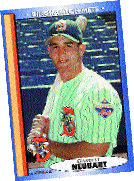Alumni Profies:
Robert Schick '48
Richard Wald '52
Valencia Gayles '88
Doug Freed '91
Garrett Neubart '95
Neubart Still Taking His Swings
|
Garrett Neubart '95 admits
that there are moments, maybe even once a week, when he has
thoughts of leaving his job, getting hired on Wall Street, and, as
he puts it, "using my education to make a living."
An outfielder in his second season with the Binghamton Mets, the Class AA affiliate of the New York Mets, Neubart works in a profession where climbing the corporate ladder means making it to Class AAA Norfolk, and upwardly mobile means employable at Shea Stadium. He actually began the year with Norfolk and is hopeful of rejoining the Tides before the end of the season.
It's not an easy path. Last year, after he was acquired from the Colorado Rockies' organization, Neubart batted .275. But due to injuries -- he was spiked in the knee, suffered a bruised heel, and a had shoulder problem that required off season arthroscopic surgery -- he missed 43 games. A leadoff hitter with speed on the basepaths, Neubart's goals this year are to bat .300, steal 50 bases, and above all, stay healthy. Athletes often worry, Neubart says, not about lacking talent, but about an injury that ends a career too soon. To many people the lifestyle of a minor league baseball player seems appealingly simple. How bad can it be when the dress code is the team uniform and overtime is extra innings? Neubart is quick to set the record straight: "There are a lot of misconceptions, that it's easy, that you make millions of dollars," he says. Not true. "It's hot. There's no freedom. You live by the schedule." For Neubart, "the schedule" means waking up around 10:00 a.m. in a spartan apartment designed for transient ballplayers, doing a few errands, and arriving at the field around 2 p.m. for a game that won't start until 7 p.m. He's at the ballpark until about 10:30 p.m., or whenever the game ends. If the next game is on the road, the team leaves by bus -- no charter flights at this level -- immediately after the game, traveling for up to seven hours to other decidedly unglamourous minor league baseball locales, like Portland, Maine, Akron, Ohio, or Bowie, Md. No summer vacation, this: Last year the team played 152 games in 151 days. Less than a week after the season ended, Neubart had moved back home to Livingston, N.J., and was at work in the brokerage services division of First Union Bank. He admits he makes better money there than he does from baseball. His teammates ask him for investment advice, and razz him about his education. "They'll say, 'What are you doing here?'" Neubart says. "But I'm just like the rest of them, with the same common dream." Minor league baseball, says Neubart, is a life in transition. "Your whole goal is to be moving up out of where you are," he says, explaining that players try not to get too comfortable in any apartment or any town. He has learned to keep his possessions to a minimum so he can pack up quickly when the call comes from above. Once, when he was with the Rockies, Neubart was moved to a higher level of Class A ball while he was on a road trip. He called back to some roommates, who packed all his belongings in his car and drove it to a predetermined location on the side of I-81. Neubart and an assistant coach later drove by and picked up the car, with all his worldly belongings in it. As Neubart sees it, making it to Class AAA depends on two variables: his level of play, and whether there's space on the roster at the next level for an outfielder/leadoff hitter. When he's finished with baseball, Neubart says he'll return to New York and look for a job in finance. But he's not putting a limit on his sporting career. "I'm not going to say, 'I have to do it this year,'" he says. "That's just added pressure. I'll stay as long as I keep making progress, and I'm having fun. Wall Street will always be there. My biggest fear is to quit too early." If Neubart quits too early, he might miss more moments like the time last year in spring training when he was the leadoff batter against 1995 Rookie of the Year Hideo Nomo. "When [Nomo] goes back into his windup, he has this hesitation," Neubart says. "Just at that moment I said to myself, 'Wow! That's Hideo Nomo. That's pretty neat.'" Undaunted, Neubart proceeded to get two hits off him. Sarah Lorge '9 |
